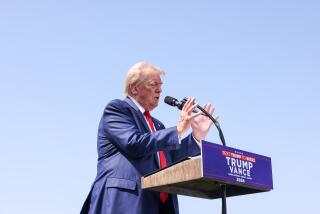Baker Warns Against U.S. Trade War With Japanese
- Share via
WASHINGTON — Treasury Secretary James A. Baker III warned Congress on Thursday that protectionist measures against Japan would lead to an “all-out trade war” that the United States might not win. At the same time, a special Japanese envoy sent here to try to cool growing protectionist sentiment made Capitol Hill his first stop.
Although “we do need more access to Japanese markets for beef, agricultural products, telecommunications and a lot of other things,” Baker told a Senate Appropriations subcommittee, “I’m just not sure that the way to get there is to have an all-out trade war. . . . I’m not sure we’d win that.”
Immediately upon arriving from Tokyo, Deputy Foreign Minister Reishi Teshima called on Rep. Don Bonker (D-Wash.), newly named by the House Democratic leadership to head a special committee to study U.S. trade problems and to try to control rising anti-Japanese emotions. Bonker warned him that Congress will take matters into its own hands if Japan does not soon open its markets to U.S. goods.
Bonker Disappointed
Aides said Bonker expressed disappointment when Teshima explained that he brought no new concessions or commitments and does not intend to negotiate during his stay here.
“I’m not terribly optimistic as a result of his visit here on Capitol Hill,” Bonker told reporters after the meeting, “but his mission was not to come forth with new concessions.”
Aides said Bonker warned Teshima that, while he and some other House Democrats see Japan as only one cause of last year’s massive $123-billion U.S. trade deficit, many members of Congress have lost patience with Japan’s unilateral barriers to foreign products. The U.S. trade deficit with Japan alone in 1984 was $37 billion, nearly one-third of the U.S. total.
Teshima was sent here by his government after the Senate Finance Committee approved legislation Tuesday mandating retaliation against Japan if its markets are not opened further and after both the House and Senate easily passed non-binding anti-Japanese trade resolutions. Earlier Thursday, Teshima told reporters during a brief stop in New York that he intends to explain the Japanese position and gauge the intensity of feeling in Congress.
‘Climate Very Hot’
“The climate is very hot,” he said. “The situation is very bad. It shouldn’t be like this. We must have a better understanding.”
The Reagan Administration sought to reassure the Japanese that it opposes protectionist legislation and at the same time that it is urging Japan to open its markets to U.S. goods, particularly in telecommunications.
White House spokesman Larry Speakes suggested that President Reagan probably would veto the Senate Finance Committee bill. “We do not support legislation that would be protectionist,” Speakes said.
Allen Wallis, under secretary of state for economic affairs, used an address to the U.S. Council for International Business in New York to urge Japan to “accept more fully the responsibilities of Western economic leadership” and “implement fully and quickly its commitments to capital market liberalization and to open its markets for goods and services.”
Warning that trade protection breeds retaliation, Wallis called on Japan and other Western trading partners to agree on a new round of tariff-reducing trade negotiations at the economic summit meeting in Bonn next month.
More to Read
Get the L.A. Times Politics newsletter
Deeply reported insights into legislation, politics and policy from Sacramento, Washington and beyond. In your inbox twice per week.
You may occasionally receive promotional content from the Los Angeles Times.








